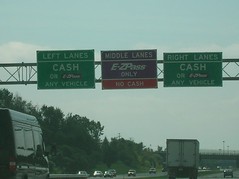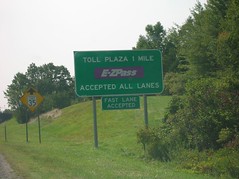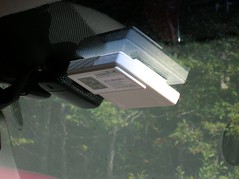While traveling on the East Coast last week, I had a chance to see tolling technology from an up-close and personal perspective. Unfortunately, as I was in a rental car, I got to see the advantages of the technology from the slow lane.

|

|

|

|
While traveling on the East Coast last week, I had a chance to see tolling technology from an up-close and personal perspective. Unfortunately, as I was in a rental car, I got to see the advantages of the technology from the slow lane.
New Hampshire uses the E-ZPass system (accepted in 11 states), while Massachusetts employs the Fast Lane system (proprietary to the Massachusetts Turnpike Authority, possibly just a private-labeled implementation of one of the commercial systems?). An important point is that these systems tend to inter-operate with each other, so you only need to invest in one transponder.
The big benefit to the consumer of course (the one I couldn’t enjoy) is to just drive through the gates, without having to pick up tickets or pay tolls.
How does payment work? You provide a credit card number, and they take $25 to fund your ‘account’. When the balance in your account gets low, they hit your credit card again to top it off at $25.
5 responses to “Field Notes on Tolling Technology”
As a former Bostonian, now a Beavertonite (or whatever) I can tell you that FastLane was created separately from EZPass. A deal was reached between EZPass (multi-state) and FastLane (MA only) that allowed each type of tag holders tags to be used in the other states. So for example, a Massachusetts driver with FastLane can go to NY, Maine, etc. and use EZPass lanes. The reverse is true as well.
Very strange that there seems to be a complete lack of tolls on the west coast. Personally, I think tolls are a bad thing from a safety standpoint. Cars and trucks running into tollboths is a common occurance, and at least once a year you hear about a toll worker getting struck by a car. Then theres the traffic backups, the fact that tolls are somewhat discriminatory since only some are tolled, and many people will skip the highways and clog up the local roads to avoid the tolls.
Beavertonian?
I am told that the union representing the toll-takers in Massachusetts has strongly opposed Fast Lane.
Ah, yes that works a bit better!
Yeah and they still do. Of course the unions oppose pretty much anything that would cost them anything, and they are usually able to win. I’m a big supporter of unions, but its pretty absurd in all of Massachusetts. As proof, take a look at the Big Dig or the MBTA.
If memory serves, Bill Weld was governor at the time and he was a huge union buster so he was able to force it though. Since everyone hates tolls, no one really shed a tear for the toll workers. Weld went a step waaaay too far though when he tried to privatize the MBTA (Boston’s Tri-met). The unions shut that plan down in about a minute, thanks in part to massive public support, and the fact that they pretty muched owned all the state legislators.
I still don’t get how the public actually supports the idea that they pay MORE for the same service (or inadequate service). Who tricks people into that in the first place. They should get fined for false advertising… At least the MBTA was able to kick Amtrak and save a !@#$ ton of cash.
…but then of course… Unions are notorious for not worrying about the customer in the least, or how much they cost everyone else they provide a service too, or how competitive they might or might not be. Amtrak’s Unions, Teacher’s Unions, and too many others to state are famous for that mess.
Yeah, but going to MBCR also has resulted in a huge drop in service. The commuter rail head was just recently forced to resign under pressure from pretty much everywhere. Coaches and loco’s are failing left and right due to maintenence cut backs, so its a huge double edged sword.